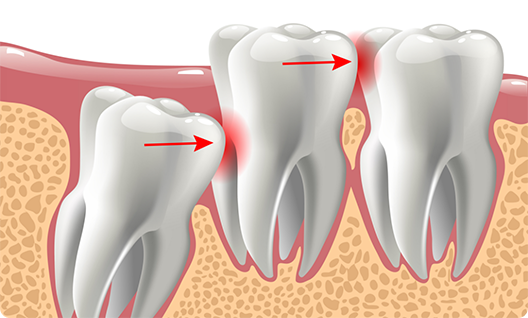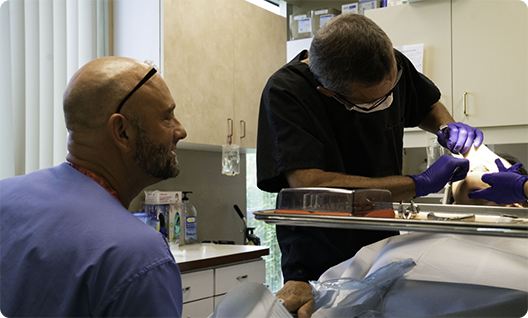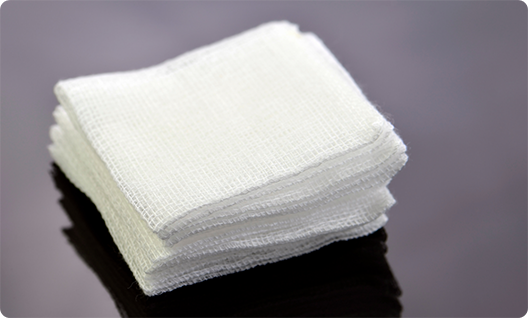@LITTLEROCKFAMILYDENTALCARE
Follow Us On InstagramWisdom Tooth Extractions Little Rock
Safe Removal for a Healthier Smile

Wisdom teeth removal is not an uncommon procedure. Most often, teens and young adults between the ages of 15 and 25 can expect their third molars (wisdom teeth) to erupt. For some, this process is not painful, nor does it cause problems; however, for a majority of individuals, it is necessary for these teeth to be removed simply because there isn’t enough room within the oral cavity. Should you discover that you must have these teeth removed, the team at Little Rock Family Dental Care is pleased to perform a safe and effective procedure that will leave you with a roomier and healthier smile. To learn more about the process or if you should consider wisdom teeth extractions in Little Rock, contact us.
Why Choose Little Rock Family Dental Care for Wisdom Teeth Extractions?
- Two Certified Oral Surgeons on Staff
- Sedation Dentistry Available for More Relaxing Experience
- Safe and Effective Surgical Methods Used for Optimal Results
Why Wisdom Teeth are Extracted

Typically, there are four reasons why someone might have their wisdom teeth removed. These include:
- The teeth are impacted, which means they did not erupt and are lying beneath the gums.
- The healthy teeth next to these third molars are damaged
- There is a high risk of infection, or it is already present
- Cysts or tumors are developing around these teeth
The truth is that your wisdom teeth are not necessary for maintaining a healthy, complete smile. In fact, these teeth were once extremely important during ancient times. Cavemen used them to consume coarser, denser foods. However, as humans evolved, diets changed as well as a narrowing of the jaw. As a result, these third molars no longer served a purpose and instead, became a problem. Nowadays, it is often better for a dentist to remove them so remaining healthy teeth are not negatively impacted.
Process for Removing Wisdom Teeth

Before your appointment, you will need to make sure someone can escort you to and from your visit, as you will receive anesthesia and sedation. If you are to discontinue any medications before your surgery, make sure you do so.
On the day of your procedure, you will undergo anesthesia before our team begins the process of removing your wisdom teeth. Depending on whether they have erupted or are impacted, the surgeon will perform a simple or surgical extraction.
During a simple extraction, they will use specialized instruments to gently move the tooth back and forth until it detaches. They will then remove the tooth fully intact. Should your wisdom teeth remain beneath the gums, they will make a small incision in the tissue, exposing the underlying bone and tooth. Dividing the tooth into sections, they will carefully remove each piece before clearing the area of any remaining debris and closing the tissue.
Gauze will be placed over the surgical site to reduce bleeding and encourage a blood clot to form.
Aftercare Instructions

After your wisdom teeth extractions in Little Rock, it is important that you follow the instructions provided to you so that you do not develop a dry socket or infection. Some things to remember include:
- Changing your gauze every 30 minutes or as needed until the bleeding stops.
- Staying hydrated by drinking plenty of water, but do not use a straw, as this could dislodge the blood clot and cause a dry socket.
- Getting plenty of rest the day of your procedure. Avoid strenuous activity or exercise for at least one week to allow for proper healing.
- Eating soft foods in the first few days.
- Taking any over-the-counter medication to alleviate pain and use a cold compress to reduce swelling.
- Rinsing with warm salt water after every meal to encourage faster healing.
- Continuing with your normal oral hygiene routine but be mindful of your surgical sites.
- Avoid spitting or using mouthwash for several days.
- Do not smoke or use tobacco products.
Wisdom Tooth Extractions FAQs
Is wisdom tooth removal painful?
Like with most extensive oral procedures, our team will make sure to completely numb your mouth with a local anesthetic before beginning any work on your tooth. We may also provide you with sedation dentistry, which will keep you relaxed throughout your treatment and even minimize any discomfort. This means you shouldn’t feel any pain during your appointment. However, you might experience some soreness or discomfort several hours after your procedure is completed. For this reason, you’ll want to adhere to your dentist’s aftercare instructions, which include taking prescribed and over-the-counter medications as directed. You should feel back to normal within a week.
What’s the best age to get wisdom teeth removed?
There is no set age when wisdom teeth should be extracted. Even so, most dentists highly recommend removing them sometime in early adulthood. Although wisdom teeth can be pulled later in life, the procedure and healing process will typically be much easier for younger patients. So, if your dentist suggests that you undergo wisdom tooth extractions, you might consider doing it sooner rather than later. This will help you avoid complications such as impaction, cysts, decay, and damage to your nearby teeth.
How long does wisdom tooth surgery take?
It typically takes around 15 to 20 minutes to extract a single wisdom tooth. Therefore, it should take somewhere around 90 minutes to pull all four. However, the exact amount of time will depend on several factors, such as the location and position of your teeth. The good news is that you will likely feel that your procedure is finished in no time if you undergo sedation therapy, as you’ll simply feel like you’ve woken up from a nap. Before beginning your procedure, your oral surgeon should be able to give you an accurate estimate of the timeframe for your treatment.
Why do we have wisdom teeth?
In modern times, wisdom teeth often feel as though they do nothing but cause trouble. But in the past, they were extremely helpful to our early human ancestors. Their diet typically consisted of raw foods, such as meats, berries, nuts, leaves, and roots. Since they didn’t prepare, cut up, or cook their meals, chewing was incredibly important. For this, they required a larger jaw and stronger molars to gnaw with. This also meant that their wisdom teeth wouldn’t cause problems when erupting. Now that our diet involves softer foods that have been cooked, diced, or otherwise prepared, our final molars aren’t usually necessary anymore. Furthermore, our jaws aren’t large enough to make room for wisdom teeth. This can cause issues to your oral health later on, such as crowding or damage to other teeth.




